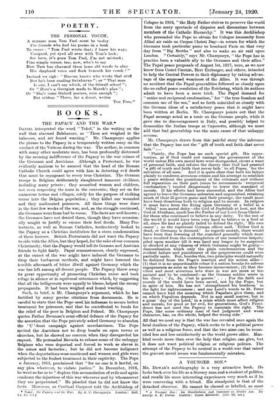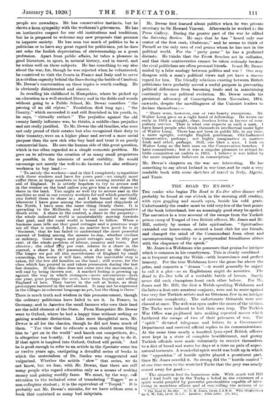A YOUNGER SON.* MR. Dzwsn's autobiography is a very attractive
book. He looks back over his life as a literary man and a student of politics, and recalls his more interesting experiences very much as if ho were conversing with a friend. His standpoint is that of the detached observer. He cannot be classed or labelled, as most
• A Younger Son : his Recollections and Opinions in Middle Age. By George A. B. Dewar. London : Grant Richards. [12s. ed. net.]
people are nowadays. He has conservative instincts, but he shows & keen sympathy with the workman's grievances. Ho has an instinotive respect for our old institutions and traditions, but he is prepared to welcome- any new proposals that promise to improve, society. He has seen too much of politics to be a politician onto have any great regard for politicians, yet he does not echo the foolish depreciation of statesmanship as a great profession. Apart from public affairs, he takes a pleasure in
good literature, in sport, in natural history, and in travel, and he writes- well on these subjects. He has something to say also about the war, for, though- he was rejected when he volunteered, he contrived to visit the fronts in France and Italy and to serve in a civilian capaoity- behind the lines duringthe battle of Caanbrai. Mr. Dewar's conversation on these topics is worth reading. He is obviously disinterested and sincere.
In recalling his childhood in Hampshire, where he picked up
an education in a well-stocked library and in the fields and woods without going to a Public School, Mr. Dewar considers " the passing of an old regime." Feudalism died long ago ; " the County," which succeeded it and still flourished in his youth, is, he- says, virtually extinct." The prejUdice against the old county' family influence was, he thinks, a middle-class prejudice and not really justified. To Mr. Dewar the old families, who were
not only proud of their estates but also recognized their duty to their tenantry, were on a higher plane and served a more social purpose than the new rich who buy land and treat it on purely commercial lines. He sees the human side of this great question, which is too often regarded as a simple economic problem. He goes on to advocate the creation of as many small proprietors as possible, in the interests of social stability. He would enoourage not merely the well-to-do farmers but also ordinary workmen to buy land:—
" To satisfy the workers—and in this I completely sympathize with these workers and have for years past—we simply must suffer theha in large numbers to have an owning interest in the soil of kngland. It is utterly hopeless to try to arouse zeal in the- w'orker on the Mod unless you give him a real chance to share in-the land. You might as well try to arouse zeal in the machine as zeal in our country workers for soil which practically you forbid them to share in ; and I am bound to say that, wherever I have gone among the workshops and shipyards of the North, I have seen the same thing clearly there. It is spreading to the Midlands, and to our more unimaginative. South even. A share in the control, a share in the property— the whole industrial world is unmistakably moving towards' that goer, and the' rural world is bound to follow.. When a business man tells me that good cottages and a generous wage are all that is needed, I know, no matter how good he is at business;' that he has failed to understand the most powerful current of feeling among the masses to-day, whether civilian or military. Good wages and good cottages may be fifty per cent. of the whole problem of labour, country and town. But observe ; the other fifty per cent. relates to a share in the control, a share in the possession, a' share in the dignity. The longer we put off this resettlement of England by small ownership, the worse it will fare, when the inevitable step is taken, for the few old families on the land ; still worse, for the crass which has poured in and taken possession during the last few deoades. If this class' does not come into the movement,. it will end by being thrown out. A marked feeling is growing up against the way in which strangers—mere adventurers—here one year, gone perhaps the next, have been buying and selling England of late. They barter in the soil at home, as their protetypes bartered in the serf abroad. It may nut be expressed in the villages in.coherent language as yet, but the thing is there."
There is much truth and wisdom in this pronouncement, though the ordinary politicians have failed to see it. In France, in Germany, and in America, the small farmers who own their land are the solid element of the State. From Hampshire Mr. Dewar went to Orford, where he had a happy time without seeking or gaining academic distinction. Like most thoughtful men, Mr.
Dewar is all for the classics/ though he did not learn much of them. " The view that to educate a man should mean fitting
him to `get on in the world' and knock out competitors, &c., in altogether too beastly. I would not train my dog to do it. If that spirit is inspired into Oxford, Oxford will perish." And he is good enough to refer town article in the Spectator some ten or twelve years ago, castigating a dreadful series of books in which the materialism of Dr. Smiles was exaggerated and
vulgarized. Whether the article " slew " that series, we do not know, but we fear, with Mr. Dewar, that there are still many people who regard education only 'as a means of making
Money and gaining worldly fame. We must, by the way, call attention to the technical error of translating " Togger " as a
non-collegiate student ; it is the equivalent of " Torpid." It is probably not Mr. Dewar's mistake, for we have seldom seen a book that contained so many bad misprints. Mr. Dewar first learned about politics when he was private Secretary to Sir Howard Vincent. Afterwards he worked is the
Press Gallery. During the greater part of the war he edited the Saturday Review. He says that he has " heard only one orator of the first rank, Gladstone," and he seems to think of Parnell as the only man of real genius whom he has met in the political world. For the " party game " he has a profound
distaste. He thinks that the Prone Benches act in collusion, and that their controversies cannot be taken seriously because the rival politicians are often personal friends. Is not Mr. Dewar misled by a false analogy between politics and war ? One may disagree with a man's political views and yet have a sincere regard for him. The friendly relations existing between British politicians have probably served a useful purpose in preventing political differences from becoming feuds' and in maintaining continuity in our political evolution. Mr. Dewar recalls his
persistent advocacy of Conscription from November, 1914, onwards, despite the unwillingness of the Unionist leaders to declare themselves :— There were, however, one or two hearty exceptions. Mr. Walter Long gave us a right hand of fellowship. He wrote me early in 1915 a straight, clear, fearless letter in favour of com- pulsory service. That is what one expecte in such a man. I have heard people who think themselves intellectual make light of Walter Long. There has not been in public life, in my time, a more upright, outright English gentleman. Old-faehioned Conservative, perhaps ; not highly imaginative in matters Irish and other, perhaps. Still, one likes A MAN. I look on Walter Long as the best man on the Conservative benches. hate committees ; but it was a singular pleasure to attend his little committee on cadets in 1915. I believe it was killed by the more impatient believers in conscription."
Mr. Dewar's chapters on the war aro interesting, He has something to say about Ireland in war time, and he ends a very readable book with some Sketches of travel in Italy, Algeria,
and Tunis.



































 Previous page
Previous page